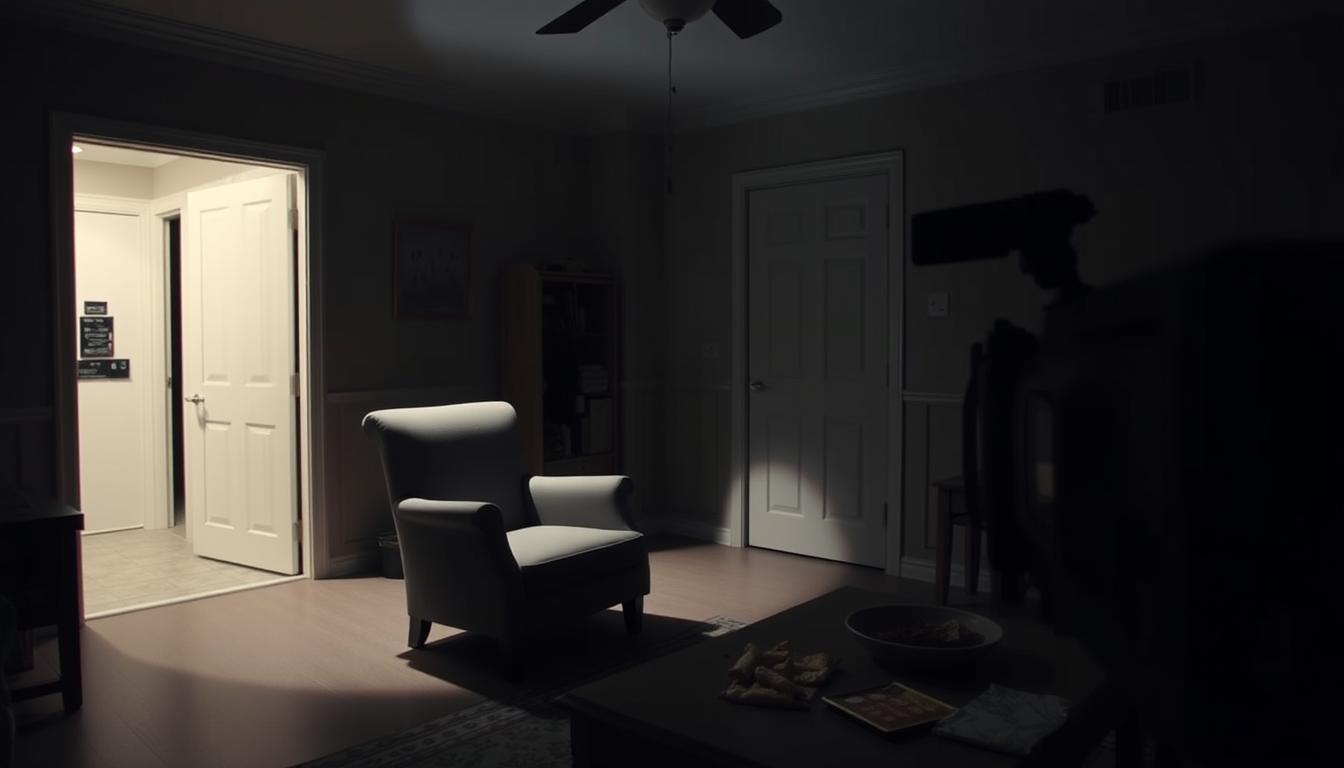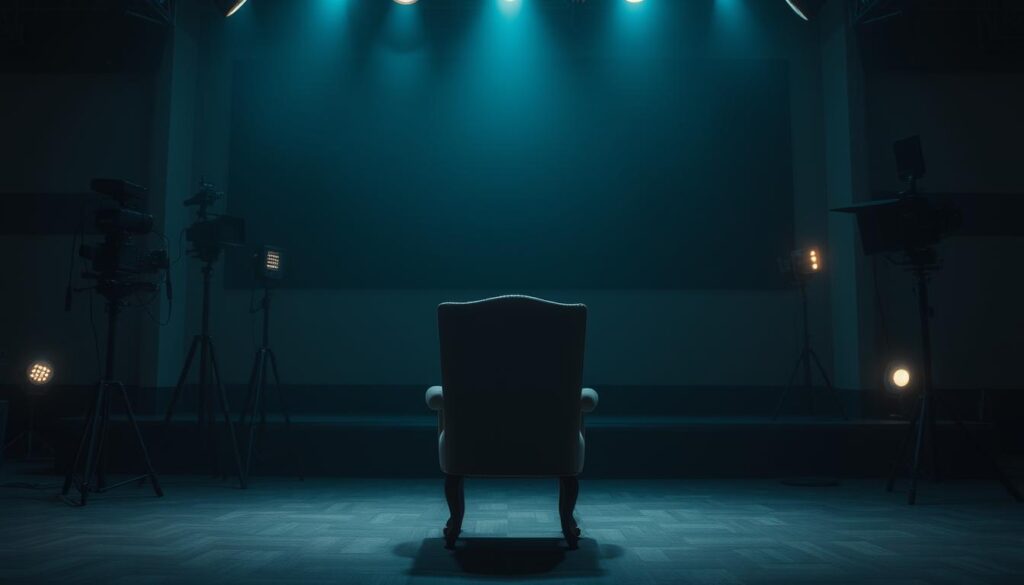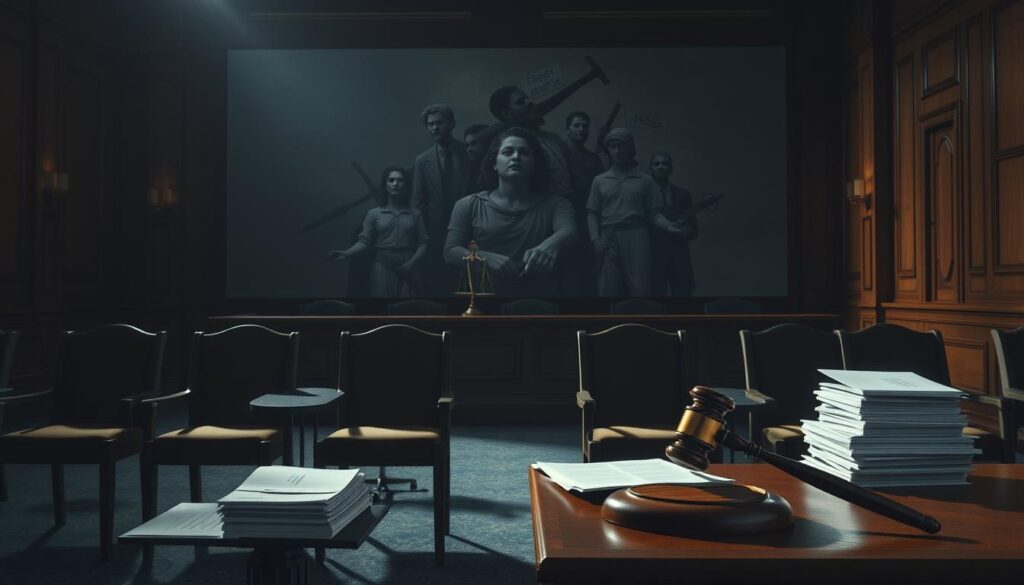Why “To Catch a Predator” Was Cancelled

The reality show “To Catch a Predator” was a hit for years. But its controversial nature led to its end. It aired on NBC from 2004 to 2008. The show set up sting operations to catch people trying to meet minors for sex.
While it was popular, it faced big ethical and legal issues. These problems led to its cancellation.
Key Takeaways
- The show “To Catch a Predator” was a controversial reality program that aired on NBC from 2004 to 2008.
- It involved setting up sting operations to catch individuals attempting to engage in sexual acts with minors.
- The show faced significant ethical concerns and legal challenges that led to its eventual cancellation.
- The show’s tactics and methods were heavily scrutinized, raising questions about the ethical boundaries of television production.
- The cancellation of “To Catch a Predator” highlighted the need for a more nuanced approach to addressing online predators and protecting minors.
The Rise of “To Catch a Predator”
“To Catch a Predator” was a groundbreaking reality TV show by Dateline NBC. It caught the attention of many and started a big talk about online predators. The show set up sting operations where volunteers, pretending to be underage, would talk to adults online. They would then meet in person.
Exploring the Show’s Concept and Premise
When the adults showed up, they were met by host Chris Hansen and the Dateline NBC crew. The show’s unique idea and to catch a predator premise aimed to show how common online predators are. It also highlighted the dangers they pose to kids.
The to catch a predator rise in fame came from people becoming more aware of online child exploitation. They wanted to see these predators punished. The show’s how to catch a predator worked method, with careful sting operations and confrontations, kept viewers hooked. It also started a big national talk on the topic.
| Key Aspects of “To Catch a Predator” | Description |
|---|---|
| Concept | Setting up sting operations to catch adults seeking to meet with underage individuals online |
| Premise | Exposing the alarming prevalence of online sexual predators and the dangers they pose to minors |
| Approach | Meticulous sting operations and confrontations with the suspected predators |
| Impact | Captivated audiences and sparked a nationwide conversation about online predators |
“The show’s innovative concept and premise aimed to expose the alarming prevalence of online sexual predators and the dangers they posed to minors.”
Ethical Concerns and Controversies
“To Catch a Predator” was a hit TV show that caught many viewers’ attention. But, its methods soon faced a lot of criticism. People said the show’s approach raised big ethical concerns and controversies.
One major issue was that the show might have enticed or entrapped people. Critics argued it wasn’t just catching predators. They thought the show was more about drama than keeping kids safe.
There were also worries about how the show affected those involved. Some believed it could lead to public shame and false accusations. This raised big questions about whether the show’s goals were worth the risks.
| Key Ethical Concerns | Potential Impact |
|---|---|
| Entrapment and Aggressive Tactics | Undermining the integrity of the legal process and public trust |
| Impact on Individuals Involved | Psychological and emotional trauma, potential for false accusations |
| Sensationalism over Public Safety | Prioritizing ratings over genuine efforts to protect vulnerable individuals |
The debate over ethical issues with “To Catch a Predator” grew stronger. This led to the show’s cancellation. The controversies surrounding the show showed the need for a better way to deal with predators. It also highlighted the importance of ethics in media and law enforcement.
The Sting Operations: A Closer Look
The show “To Catch a Predator” was all about sting operations. The producers set up fake online profiles of kids and talked to adults who wanted to meet them. When these adults showed up, they were caught by Chris Hansen and the camera crew.
The show aimed to show how predators act. But, many questioned if it was right. The producers used tricks like making friends online and giving gifts to the suspects.
| Sting Operation Tactic | Description |
|---|---|
| Online Persona Creation | The producers would create online profiles of underage individuals to lure in potential predators. |
| Conversation Building | The producers would engage in lengthy online conversations with the suspects, building a sense of trust and rapport. |
| Decoy Homes | The producers would arrange for the suspects to meet the “underage individuals” at decoy homes, where they would be confronted by the show’s crew. |
| Bait and Entrapment | The producers would sometimes provide alcohol or gifts to the suspects upon their arrival, potentially crossing ethical boundaries. |
The sting operations and tactics and methods were key to “To Catch a Predator.” But, they also sparked a big debate on ethics and law.
Legal Battles and Lawsuits
The TV show “To Catch a Predator” faced a lot of legal trouble. People who were caught said their rights were broken. They thought the show’s way of catching them was unfair. This led to a lot of lawsuits and put pressure on the show.
Analyzing the Show’s Legal Implications
The show’s way of catching predators was a big issue. Critics said it was like entrapment, which is against the law. Many lawsuits were filed because of this.
One case was especially serious. A man who was caught in a sting operation died. His family sued, saying the show’s actions led to his death. This case made everyone think more about the show’s ethics and laws.
Even though the show’s creators said they were protecting kids, the legal fights and public criticism ended the show. This shows how tricky it is to make TV about serious topics.
“The show’s tactics and methods also led to numerous legal battles and lawsuits. Some individuals who were caught in the sting operations claimed that their rights had been violated, while others argued that the show’s approach was unconstitutional.”
The Impact on Public Perception
“To Catch a Predator” had a big impact on how people see online predators. The show’s dramatic scenes and arrests made people talk about the need to protect kids. It showed how important it is to have strong laws and better enforcement.
People were shocked, angry, and more aware of the problem after watching the show. The show’s way of showing predators getting caught made viewers realize how serious it is. It showed that these predators were looking to harm kids online.
The show’s effect went beyond just making people upset. It led to more focus and money on stopping online child predators. New laws and ways for police to catch these criminals were created because of it.
| Public Perception Before “To Catch a Predator” | Public Perception After “To Catch a Predator” |
|---|---|
| Limited awareness of the prevalence of online predators | Heightened awareness and concern about the issue |
| Lack of urgency in addressing the problem | Increased calls for stricter laws and tougher enforcement |
| Public indifference or complacency | Outrage and demand for action to protect children |
The show’s effect on how people see things was huge and lasted a long time. The show’s shocking stories and the legal and social fallout made people more aware. It made them feel like they needed to do something about online predators.
“The show’s impact was undeniable. It thrust the issue of online predators into the national spotlight and compelled the public to confront a harsh reality that many had previously overlooked.”
Why “To Catch a Predator” Was Cancelled
The reality TV show “To Catch a Predator” was a hit for years. But, it ended in 2008 due to several reasons. The show’s methods, legal issues, and how it was seen by the public all played a part.
Many people questioned the show’s ethics. They felt the way it caught predators was wrong. It was seen as a breach of civil rights and the law.
- Mounting ethical concerns over the show’s tactics and their potential legal implications
- Pressure from critics and advocacy groups who argued the show’s methods were unethical and unfair
- Legal battles and lawsuits that threatened the viability of the program
Legal troubles also hurt the show. People who were caught on the show sued, saying they were unfairly trapped. These lawsuits made NBC decide to stop the show.
The show’s image also suffered. As more people learned about its methods, they lost trust. This made it hard for the show to keep going without more criticism.
“The show’s aggressive approach was seen by many as a violation of civil liberties and due process.”
In the end, the show was cancelled in 2008. NBC’s decision ended a chapter in reality TV. It raised big questions about law enforcement and individual rights.

The Role of Law Enforcement
The sting operations on “To Catch a Predator” were a team effort with local law enforcement agencies. The show’s producers worked closely with police to set up the stings and make arrests. This raised important questions about the right role of authorities in these operations.
Examining the Involvement of Police and Authorities
The show’s use of law enforcement to carry out stings mixed entertainment with real law enforcement. Critics said the police were treated like props, which could harm the integrity of the investigations. They worried that the show’s producers were in charge, with police just helping out.
| Law Enforcement Involvement | Police Role | Authorities’ Involvement |
|---|---|---|
| Extensive collaboration between the show’s producers and local law enforcement agencies | Police officers participated in the sting operations, making arrests and gathering evidence | Authorities, including prosecutors and judges, were involved in the legal proceedings and rulings related to the cases |
| Concerns about law enforcement being used as props by the show’s producers | Questions about the appropriate level of police involvement in the stings | Debates over the legal implications and ethical considerations of the authorities’ role |
The controversy over law enforcement involvement, police role, and authorities’ role in “To Catch a Predator” was a big reason for its cancellation.
The Aftermath and Ripple Effects
The cancellation of “To Catch a Predator” had big effects, starting a debate about its end. The show raised awareness about online predators but faced legal and ethical issues. Experts, lawmakers, and the public are still talking about it.
The show’s end changed how media deals with internet predators. Some say its sensational style hurt more than helped, damaging suspects’ rights and law enforcement work.
The ripple effects of “To Catch a Predator” include more scrutiny of sting operations. People are now calling for better, more ethical ways to fight online sexual exploitation.
The aftermath of “To Catch a Predator” has changed how we see these cases. Some think the show made us too scared and mistrustful. Now, there’s a push for a kinder, more understanding way to handle online predators.
| Key Ripple Effects | Impact on Public Perception |
|---|---|
|
|
“To Catch a Predator” left a lasting mark, balancing awareness with ethical worries. As we deal with its cancellation’s effects, finding a better way to fight online predators is key.
“The cancellation of ‘To Catch a Predator’ marked a significant shift in the media’s approach to exposing and addressing the issue of internet-based sexual predators.”
Criticisms and Counterarguments
The reality TV show “To Catch a Predator” has sparked a lot of debate. Some people think it helped expose online predators. But others have big concerns about its methods.
Exploring the Opposing Views and Debates
Many criticize the show for its aggressive sting operations. They say it could be seen as entrapment. This approach, they argue, focuses too much on drama and not enough on fairness.
On the other hand, some see the show as a vital tool. They believe it brought attention to the dangers of online predators. They think the show’s tactics, though controversial, were needed to show the problem’s size and push for change.
| Criticisms | Counterarguments |
|---|---|
| Aggressive sting operations that could be seen as entrapment | Necessary to expose the scale of the problem and prompt action |
| Prioritizing sensationalism over ethical and legal considerations | Raising awareness about the dangers of online predators |
| Potential for false accusations or unjust outcomes | Proactive measures to protect vulnerable individuals |
The debates show how complex and divisive the issues are. It’s crucial to consider both sides. We need a fair and ethical way to tackle online predators.

Lessons Learned and Ethical Considerations
The end of “To Catch a Predator” has made us think more about ethics and laws. It’s about how we handle sting operations and media in cases of suspected sexual predation. Now, we’re focusing on fair and respectful ways to deal with this issue.
One big lesson from “To Catch a Predator” is the need for balance. Law enforcement and individual rights are both crucial. The show aimed to catch predators, but its methods raised questions about fairness and the right to be presumed innocent.
Looking back, we see that ethics must guide our fight against sexual predation. Sting operations and media exposure need careful thought to protect everyone’s rights and dignity.
“The cancellation of ‘To Catch a Predator’ has prompted a deeper examination of the ethical and legal considerations surrounding the use of sting operations and media exposure in cases of suspected sexual predation.”
Going forward, we need teamwork from lawmakers, law enforcement, and the media. We should aim for fair and ethical ways to tackle this issue. This could mean:
- Setting up better rules for sting operations
- Making sure suspects’ privacy and rights are respected
- Putting more focus on helping victims and preventing abuse
- Starting campaigns to teach people about prevention and early action
By learning from “To Catch a Predator” and putting ethics first, we can fight sexual predation better. We can do it in a way that respects everyone’s rights and dignity.
The Future of Reality TV and Predator Stings
“To Catch a Predator” has left a mark on reality TV. It sparked debates on ethics but also started a conversation about media’s role. We need better ways to tackle online predators.
Reality TV is changing, moving towards more careful and ethical ways to tackle predators. The show showed media’s power to highlight big issues. But, it also showed the need for teamwork between law, advocacy, and media.
One new idea is virtual sting operations. Here, police talk to suspects online, not in person. This method aims to catch predators without the drama and ethics issues of “To Catch a Predator.”
| Approach | Potential Benefits | Potential Drawbacks |
|---|---|---|
| Virtual Sting Operations |
|
|
As reality TV grows, it’s key for producers, police, and advocates to team up. They must find ways to inform the public without hurting anyone. This way, reality TV and predator stings can move forward in a positive way.
“The legacy of ‘To Catch a Predator’ has demonstrated the power of media to confront social issues, but also the need for more thoughtful and collaborative solutions.”
Conclusion: Reflecting on the Legacy of “To Catch a Predator”
The end of “To Catch a Predator” was a big moment in reality TV. It made us think deeply about the right way to deal with online predators. The show did raise awareness, but its methods and legal fights led to its end.
The show’s impact still shapes how we talk about sexual exploitation. It teaches us about the importance of ethics and law in media and law enforcement. It shows how hard it is to solve this big problem.
Looking back, “To Catch a Predator” left a lasting mark. It makes us think about better ways to protect people and catch bad guys. The show’s story teaches us important lessons for fighting online predators and keeping justice fair.

Leave a Reply